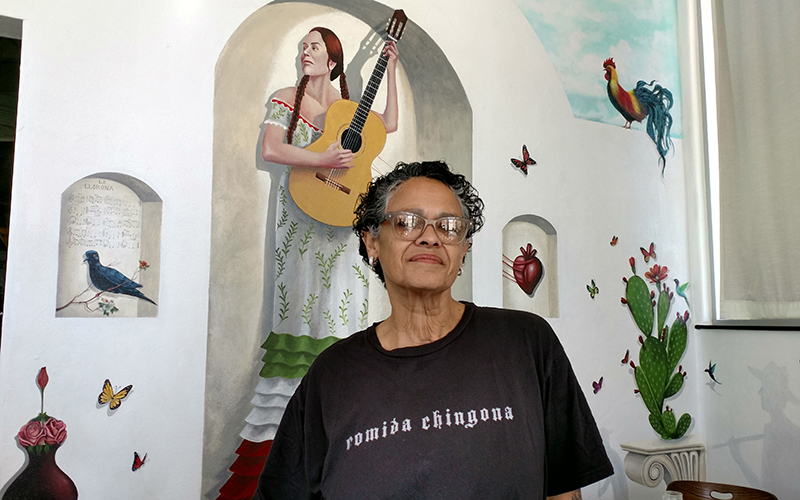
Phoenix entrepreneur and chef Silvana Salcido Esparza, who owns the popular Barrio Cafe and other eateries, said she’s had some form of a business for as long as she can remember. (Photo by Kara Carlson/Cronkite News)
PHOENIX – The number of Latino-owned businesses in Arizona doubled from 2007 to 2015, according to recent data released by the Arizona Hispanic Chamber of Commerce. And the group has more purchasing power than ever.
Chamber spokesman James Garcia credited increases in entrepreneurism and economic impact to the population’s rise in size and education levels.
In 2007, Latinos owned 52,000 businesses in the state. By 2015, that figure had jumped to
123,000, according to DATOS: The State of Arizona’s Hispanic Market. During the same time period, businesses overall grew just 2 percent in the state.
“The Spanish-speaking entrepreneurs have always been here, they just haven’t had an opportunity to get their voice out,” said Jose Urteaga, who runs Fuerza Local, a business accelerator that educates Latinos on how to run a business.
The chamber releases the research yearly, and it examines trends in the local and national market.
Nationally, Hispanic-owned businesses account for one out five new businesses. Young Latinos are increasingly joining in business creation, with millennials making up nearly half of Latino business owners, according to the report.
Women-owned businesses lead the way
Women business owners also have seen especially high gains. The report said in Arizona, women own the majority of Latino-owned companies.
Silvana Salcido Esparza said she’s not surprised.
“Latina women put a little extra sauce on everything,” said Esparza, a Phoenix-based entrepreneur and chef. “We’re leaders. We take care of our family. Something happens in the household, we take care of it. And we do the same thing in business.”
Esparza, who grew up in California, said she has been a business owner since childhood. Her first business was selling marbles and penny candy in school, and she later sold carnitas in her dad’s bakery once she turned 15. Now, she owns several restaurants in Phoenix, including Barrio Cafe and Barrio Cafe Gran Reserva.
The popular James Beard-nominated chef said she has noticed more Spanish-speaking and female entrepreneurs in recent years, but she said it hasn’t always been this way.
“I’ve been the solitary female chef that’s running with the boys,” Esparza said. She opened her first restaurant in Phoenix in 2002. In 2004, she was inducted into the the Arizona Culinary Hall of Fame. She said she was the first women of color to receive the award.
Today, women play a large role in growing business. Urteaga said women make up the majority – 58 percent – of his Fuerza Local graduates.
Population growth, Recession lead to more entrepreneurship
Garcia said much of the overall growth in Latino entrepreneurship has to do with increases in population. Arizona’s Latino population tripled between 1990 and 2015, although the growth has slowed some since 2007.
Garcia said the growing population means Arizona’s Hispanic population has more of a voice to demand what they want.
“For the entire state to advance, the Hispanic community has to advance.” Garcia said. “A generation from now, every other person in the state could be Hispanic.”
Urteaga said programs like his offer resources and information that weren’t always available to Spanish speakers.
“Traditionally, these resources have only been available in English,” Urteaga said. “People have put out these resources and say they’re here if you can read them.”
During the Great Recession, Garcia said Latinos also faced higher-than-average unemployment, which may have actually helped boost entrepreneurship.
“It leaves people in a situation where they go, ‘Oh, I’ve got to make a living. How do I do that?'” Garcia said. He said more Latinos turned to starting a business to try to make up for lost revenue.
Educational attainment plays a role in business ownership
The report found graduation rates for Latinos have increased both at the high school and college level overall.
From 2010 to 2015, Latino high school graduates increased by nearly 20 percent, and college graduates by about 40 percent. According to the report, 50 percent of business owners now have at least a bachelor’s degree.
“The community overall is growing its middle class and entrepreneurial class, which overall is a good thing,” Garcia said.
And officials are paying more attention to Latino students: Latino children now make up nearly 50 percent of students in Arizona K-12 schools.
“Educational leaders have soaked in you can’t ignore this population of school children because if you do, it’s at the detriment of really the entire state and the entire community,” Garcia said.
He added that in the past, it was easier for Hispanic students to slip through the cracks.
Report finds inequality
The DATOS report pointed out that despite the increase in business creation, Latino-owned businesses generally make a fraction of the money their non-Latino counterparts make.
Esparza said it can be difficult for women and people of color to break into entrepreneurism.
She said people have the power to choose what communities they support with each dollar they spend.
“They talk about ‘shop local.’ I think you should shop brown,” Esparza said. “I think you should shop women owned. I think you should shop minority owned. I think you should shop local, definitely, but it goes deeper.”
Esparza also has concerns over people who are “culture vultures,” or people who appropriate Latino culture.
“The entrepreneur in my blood wants to grow, but I have to be careful because there’s culture vultures out there trying to take what I’ve worked so hard to obtain and to create,” she said.